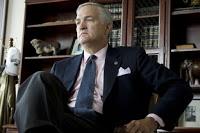
Luther Strange
If VictoryLand officials were to seek "preaction discovery" related to Attorney General Luther Strange and his crusade to close the casino, how might the process work? A 1994 ruling from the Alabama Supreme Court provides a road map.We've shown that Rule 27 of the Alabama Rules of Civil Procedure (ARCP) is a vehicle for parties to conduct "preaction discovery" in order to determine any "cognizable" legal claim they might have--and against whom a potential lawsuit might be directed.
A case styled Ex parte Anderson, 644 So. 2d 961 (Ala. Sup. Ct., 1994) provides insight on how VictoryLand might be able to proceed. The case involved Loyd L. Anderson, who had been fired from his position with the Shelby County Sheriff's Office and sought information for a possible lawsuit against the Shelby County Commission. Specifically, Anderson sought documents from an Alabama Bureau of Investigation (ABI) probe that led to his departure from the sheriff's department.
The trial court granted Anderson's petition. But Major Jerry Shoemaker, head of ABI, appealed to the Alabama Court of Civil Appeals, which found that Anderson was not entitled to discovery because Rule 27 applied only in cases where evidence might be lost or destroyed.
Anderson appealed to the Alabama Supreme Court, which ruled in his favor, stating that the federal counterpart to Rule 27 indeed involved only evidence that might be lost, but the Alabama rule is broader in scope. Here is how the high court summarized the issues at stake:
Anderson alleged in his Rule 27 petition that he expected to sue the [Shelby County] Commission for money he claimed was owed to him as a result of his previous employment. Anderson took the position that he needed to see the ABI's records before he could make a good faith determination as to whether he had a cause of action against the Commission. After conducting a hearing, at which Anderson and the ABI were represented by counsel, the trial court ordered the ABI to comply with Anderson's discovery request. . . .
The Court of Civil Appeals reversed the judgment, holding that Anderson's petition was not sufficiently specific to state a claim under Rule 27 and that he was not entitled under Rule 27 to require the production of the ABI's records, in the absence of evidence that those records were in danger of being lost or destroyed. . . . Presiding Judge [William E.} Robertson dissented, stating that he could find no basis for holding that the trial court had abused its power in granting Anderson's discovery request.
The Alabama Supreme Court wound up agreeing with Robertson, stating:
Although Alabama Rule 27 does not give a potential plaintiff "carte blanche" to "fish" for a ground for filing an action, it nonetheless provides for preaction "discovery under Rule 34," regardless of any need to perpetuate evidence, provided that the requirements of the rule are met and that the trial court is satisfied that such discovery might serve to prevent a failure or delay of justice. . . .
We must agree with Anderson and the trial court that Rule 27 is significantly different from the federal rule and that it does not limit preaction discovery under Rule 34 to perpetuating evidence. We note in this regard that limited use of Rule 27 for the purpose of evaluating a potential claim is entirely consistent with the underlying purpose of both Rule 11, Ala.R.Civ.P., and the Alabama Litigation Accountability Act, Ala.Code 1975, § 12-19-270 et seq., in that Rule 27 provides a limited means by which potential plaintiffs (and their attorneys), within the discretion of the trial court, can examine evidence before actually deciding whether they have a reasonable basis for filing an action.
What does this mean for VictoryLand? While it doesn't have "carte blanche" to "fish" for information (whatever that means), it is entitled to discovery that might help it evaluate a potential claim or respond to an appeal, which Strange has filed. The Anderson ruling suggests that even a law-enforcement agency can be subject to discovery under Rule 27. The court, however, did provide this qualifier in a footnote:
We make no judgment as to whether the ABI's records are protected from disclosure under other provisions of Alabama law. The Court of Civil Appeals reversed the trial court's judgment on the holdings that Anderson's petition was not sufficiently specific to state a claim and that he was not entitled to preaction discovery of the ABI's records for the purpose of evaluating a potential cause of action. It did not rule one way or the other as to whether the ABI's records should be the subject of a protective order. Our review in this case is limited to those particular holdings.
As we noted in our previous post on this subject, prosecutors generally are immune from suit, and our guess is that records of the Attorney General's Office likely are protected under some provision of state law. But VictoryLand's interest might be in seeking information from, or about, those individuals or entities that it believes have influenced Strange and the Alabama Supreme Court to act unlawfully against it--resulting in damages that likely reach the tens of millions of dollars, if not more.
Who might some of those individuals and entities be? Likely candidates include former Governor Bob Riley, attorney Rob Riley (the former governor's son), House Speaker Mike Hubbard, anti-gambling activist Eric Johnston, former Strange campaign manager Jessica Medeiros Garrison, and officials with the Poarch Creek and Mississippi Choctaw tribes.
Discovery related to those individuals, and perhaps others, almost certainly would bolster VictoryLand's position on appeal--and for any action it might bring in the future to recover economic damages.
